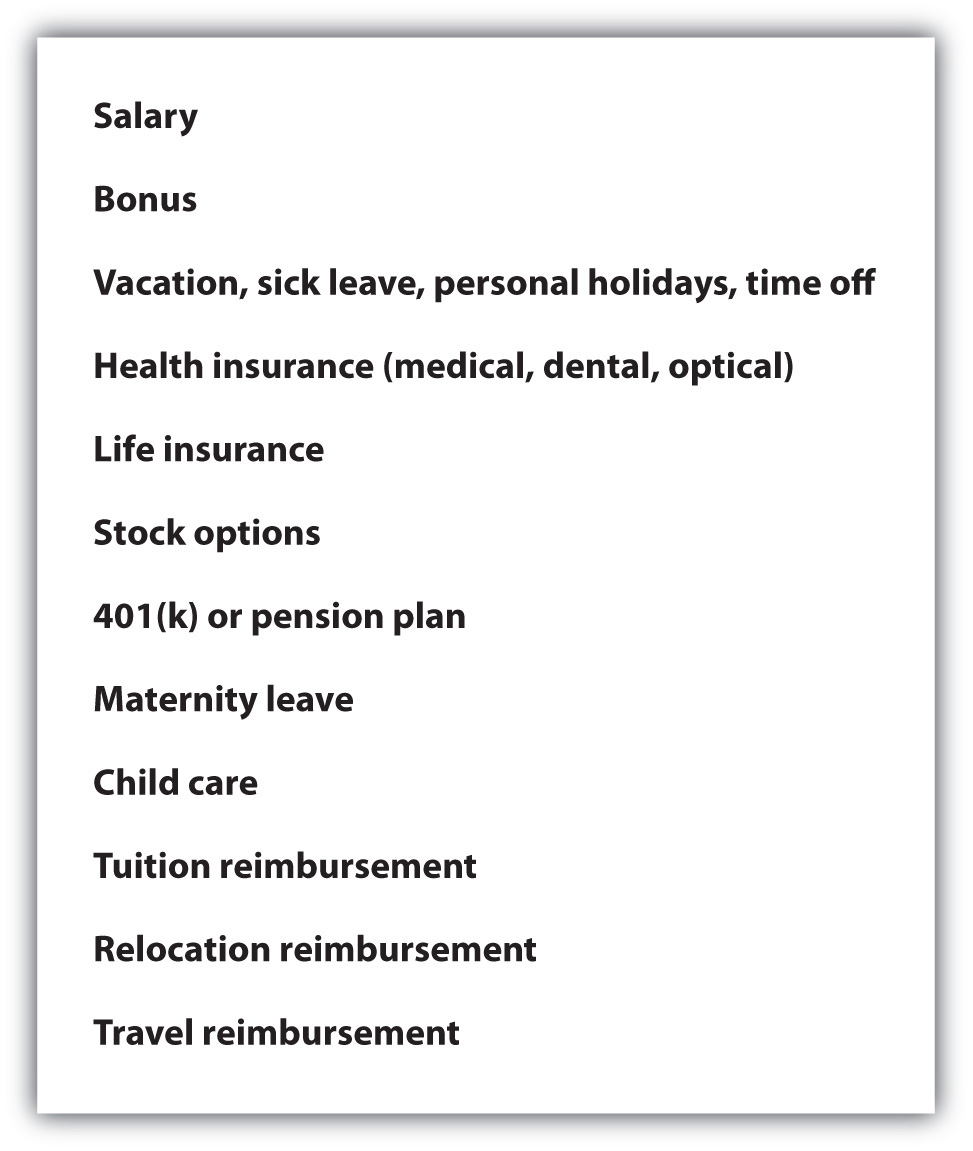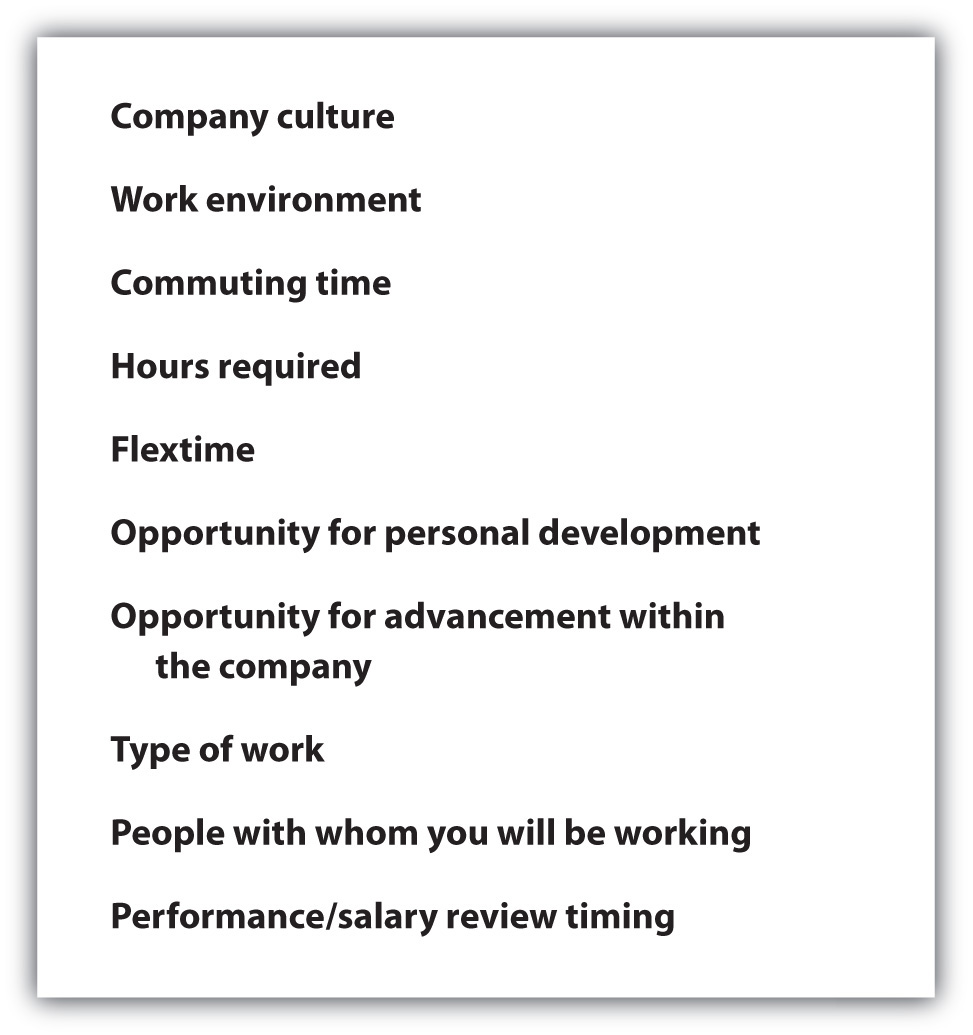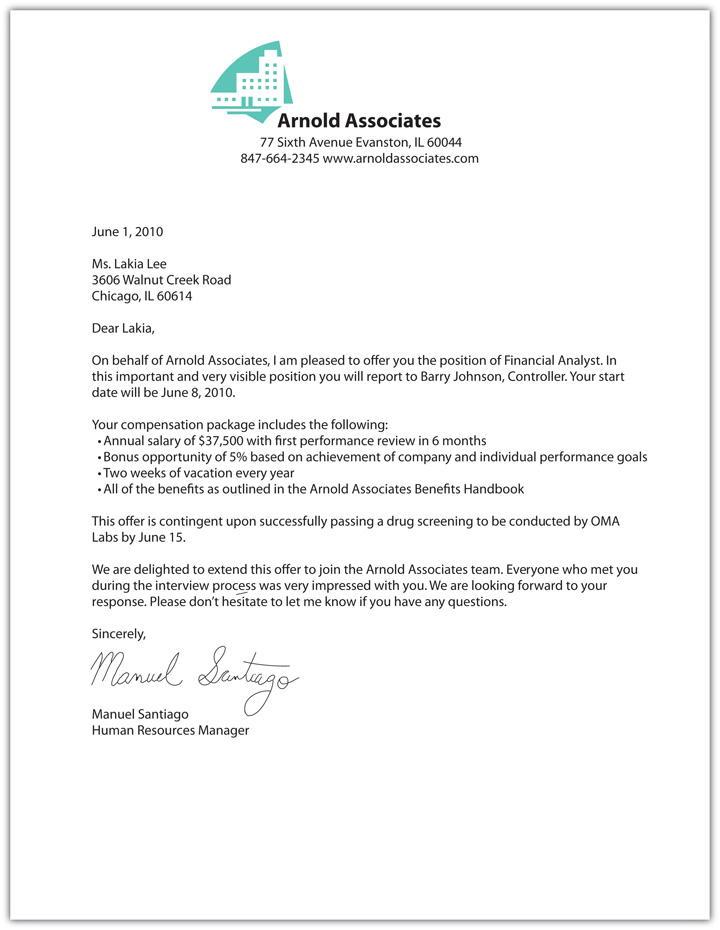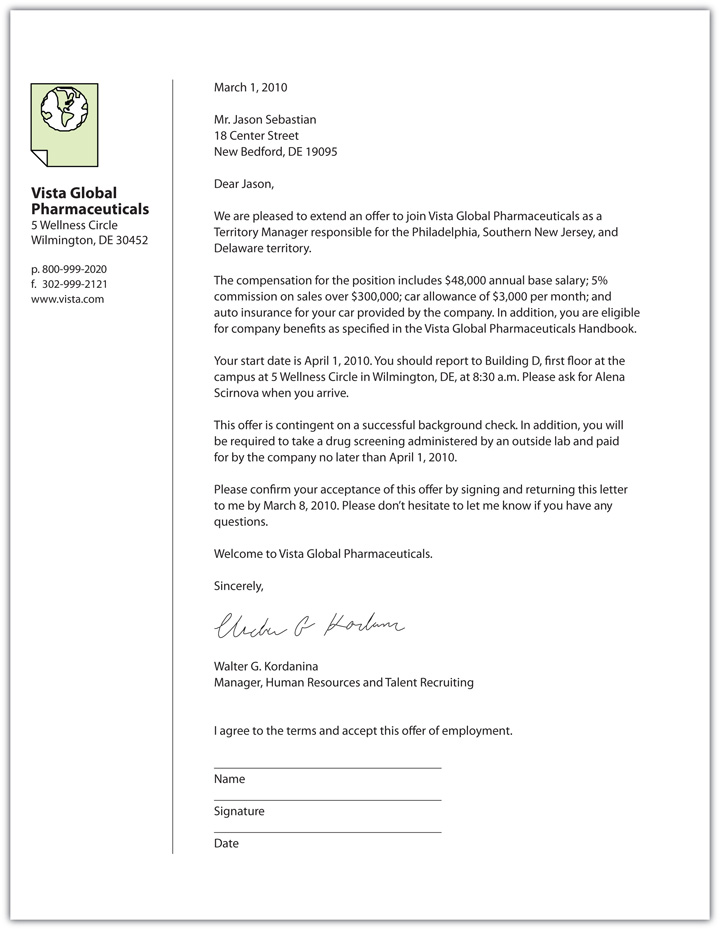This is “Selling U: Negotiating to Win for Your Job Offer”, section 12.3 from the book Powerful Selling (v. 1.0). For details on it (including licensing), click here.
For more information on the source of this book, or why it is available for free, please see the project's home page. You can browse or download additional books there. To download a .zip file containing this book to use offline, simply click here.
12.3 Selling U: Negotiating to Win for Your Job Offer
Learning Objective
- Understand how to negotiate and accept the right job offer.
So you’ve completed all your interviews and it’s the moment of truth…you are on the verge or receiving an internship or job offer. Congratulations!
As difficult as it has been to get to this point, you’re not quite there yet. This is the stage of the job searching process that really tests your mettle to get what you want. Just like negotiating and closing (outlined in the previous sections of this chapter), the quality of the job offer starts long before you actually receive the offer.
Know What You’re Worth
Before you even begin thinking about looking for an internship or job, your first step should be to determine your value based on the marketplace. As with every step of the selling process, doing your homework is key. If you don’t do your research to find out competitive compensation packages for the position and city in which you are seeking an internship or job, you might be disappointed with the job offers you receive.
There are several Web sites—Salary.com, JobStar.com, and SalaryExpert.com are just a few—that include compensation ranges for hundreds of different positions in areas across the country. Visit the sites listed in Table 12.1 "Web Sites for Researching Compensation" to gather compensation information before you go on any interviews.
Table 12.1 Web Sites for Researching Compensation
| Riley Guide | http://rileyguide.com/salguides.html |
| Salary.com | http://swz.salary.com |
| JobStar.com | http://jobstar.org/tools/salary/sal-prof.php |
| SalaryExpert.com | http://www.salaryexpert.com/index.cfm?fuseaction=Main.Home_Personal |
| CareerBuilder.com | http://www.cbsalary.com/?siteid=cbcrcnav |
| Bureau of Labor Statistics | http://www.bls.gov/NCS |
It’s a good idea to use these tools as a guide as there are many assumptions that are made when these numbers are prepared. However, this information can be extremely helpful to understand the range of compensation being paid for a specific role in a specific city.“Evaluating the Salary Information You’ve Found,” The Riley Guide, http://www.rileyguide.com/saleval.html (accessed November 21, 2009). You will be able to negotiate more effectively if you walk into every job interview knowing how much you are worth.Kim Richmond, Brand You, 3rd ed. (Upper Saddle River, NJ: Pearson Prentice Hall, 2008), 201.
Establish Your Value Early
Just as in the selling process, establishing your value begins with your first contact with your prospective employer. Many times you have the opportunity to meet at least one or two people at the company, usually someone in human resources as well as your hiring manager. In some cases, you may meet with several different people with whom you will be working. In some cases, you may also talk with or meet with a recruiter. At any rate, you have the opportunity to establish your value with as many people as you meet. Everything you say and do has an impact on how people perceive you and your value. Are your résumé and cover letter professional? Did you do your research before you contacted the employer? How did you make contact? When you went in for an interview, did you dress appropriately and professionally? Were you prepared for the interview? Did you bring samples of your work to demonstrate your skills? Did you follow up with a thank-you e-mail and handwritten thank-you note within twenty-four hours? All these elements help establish your value long before an offer is extended. When it comes to making an impression on a prospective employer, everything matters.
Just as in the selling process, if you do your homework and establish your value early in the process, you will be more likely to get the offer you want.
Compensation versus Salary
One thing to know before you walk into any interview: compensation is different from salary. CompensationMoney and benefits received in exchange for providing services to a company including elements such as salary, commission, bonus, benefits, and any other elements in payment for providing services. is the total amount of money and benefits that you are paid for a particular position. Compensation can include salary, insurance, vacation or sick leave, stock options, signing bonus, car allowance, 401(k), child care or elder care assistance, and any other type of payment received in exchange for your services to the company. SalaryA regular payment from an employer in exchange for services., a fixed amount of money that is paid regularly in exchange for services provided, is only one element of compensation. When you are considering a job offer, it’s best to keep in mind that salary is not the only element of compensation. This will allow you to be creative in your negotiating as there are several elements other than salary that can be included in your total compensation package.
Starting Out at a Start-Up
Working for a start-up company can be exciting and lucrative—with the right compensation agreement. The high-risk environment of a start-up might provide exactly the right place for you to start your career. But enter the business with your eyes wide open. “There’s no shortage of start-ups to work for, but most are going to fail,” says Greg Carney of Carney-Neuhaus.Dona DeZube, “Negotiating Compensation for a Job at a Startup,” Monster.com, http://career-advice.monster.com/salary-benefits/negotiation-tips/negotiating-compensation-startup/article.aspx (accessed November 22, 2009). This article provides insight about how to structure compensation with a start-up company.
Timing Is Everything
Although you may want to discuss compensation on your first interview, it’s a good idea to postpone discussing the topic as long as possible.Kim Richmond, Brand You, 3rd ed. (Upper Saddle River, NJ: Pearson Prentice Hall, 2008), 202. Just as in the selling process, you want to put focus on establishing your value and learning about what’s important to your prospective employer before you begin discussing compensation. A word of caution: you should be prepared to give your desired salary range on an interview as many employers want to understand your salary expectations as soon as possible. If you can avoid the topic, do so until you receive a job offer. Here’s an example of how you can deflect the conversation.
| Interviewer: | What are your salary expectations? |
| You: | I’m sure your total compensation package is competitive for the position. What’s most important to me is the opportunity to learn and be a part of an organization like yours. |
If you are forced to give a salary range, be sure you can live with the lowest number you give. Once you say a number, it will be extremely difficult to negotiate above that salary.Kim Richmond, Brand You, 3rd ed. (Upper Saddle River, NJ: Pearson Prentice Hall, 2008), 202.
Receiving the Offer
Most job offers are extended over the phone, although some may be extended in a letter and still others may be presented in person. Since companies usually interview multiple candidates for each position, chances are you won’t receive a job offer on an interview. However, you should be prepared to respond to a job offer if one is presented during an interview.
Video Clip
Responding to an Offer in an Interview
(click to see video)The following video provides suggestions about how to handle this situation.
When you receive an offer, it will most likely come over the phone. When you get a phone call about an offer, write down every element of the offer (it’s OK to ask the person to hold while you get a pencil and paper). Thank the person who made the offer and tell her how pleased you are to receive the offer. Even if you think you want to accept the offer, don’t accept it right away.
| You: | I’m very excited about this offer. Thank you so much for extending it to me. It’s a very big decision, and I’d like to have a few days to think about it. Can I get back to you on Thursday? What time is good for you to talk? |
| Employer: | I’m glad to hear that you are happy about the offer. We are all very excited about the prospect of you joining our team. I’m happy to answer any questions you might have about the company or the offer. Don’t hesitate to give me a call. In fact, let me give you my cell phone number so you can call me at any time. Then let’s touch base on Thursday at 10:00 a.m. |
| You: | I just want to repeat the elements of the offer so that I have it correct. The base salary is $45,000 with the opportunity to earn a bonus of 5 percent based on meeting performance objectives. There is a car allowance of $3,000 a month. I’ll be eligible for medical insurance after thirty days of employment, and I’ll receive one week of vacation after working for twelve months. Is that right? |
It’s worth noting the time element of this negotiation. You should take as much time as you need to evaluate the offer, but you should be reasonable and state the time frame you need. Recall from earlier in this chapter that time is one of the elements that is always present in a negotiation. Sometimes a prospective employer or recruiter will try to create a deadline to force you to make a decision by a specific date. Use time to your advantage and negotiate for more time so that you don’t feel as if you are under pressure to make this important decision.
Evaluating the Offer
Congratulations on your offer! Although it’s a difficult economy, don’t feel pressured to take the first offer you get. Take the first offer you get for a job you really want. This is a special moment; it is the time when the power shifts from the prospective employer to you (remember that power is one of the elements that is always present in a negotiation). Your prospective employer has now indicated that you are their choice for the position. You have the opportunity to take the offer, counterofferA candidate’s response to a job offer. (your response to the job offer), or walk away. Whatever your choice, you have the power. As soon as you make your choice, the power shifts back to your prospective employer. That’s why it’s a good idea to take your time and completely evaluate your offer before you respond.
Now that you have all the elements of the offer, you can begin to evaluate it. Just as in a negotiation in selling, identify what is important to you. Consider making a list that includes both elements of compensation as well as other elements such as culture, opportunity, environment, commuting distance, and so on. Figure 12.6 "Compensation Elements to Consider in a Job Offer" and Figure 12.7 "Other Elements to Consider When Evaluating a Job Offer" can provide some ideas to help you create your list.Adapted from Kim Richmond, Brand You, 3rd ed. (Upper Saddle River, NJ: Prentice Hall, 2008), 204; and Paul W. Barada, “Job Offer Evaluation Checklist,” Monster.com, http://career-advice.monster.com/salary-benefits/Negotiation-Tips/Job-Offer-Evaluation-Checklist/article.aspx (accessed November 21, 2009).,Adapted from Kim Richmond, Brand You, 3rd ed. (Upper Saddle River, NJ: Prentice Hall, 2008), 206; and Paul W. Barada, “Job Offer Evaluation Checklist,” Monster.com, http://career-advice.monster.com/salary-benefits/Negotiation-Tips/Job-Offer-Evaluation-Checklist/article.aspx (accessed November 21, 2009).
Figure 12.6 Compensation Elements to Consider in a Job Offer

Figure 12.7 Other Elements to Consider When Evaluating a Job Offer

Only you can determine if a job offer is right for you. The following are some additional resources that you may want to review to help you evaluate a job offer:
- http://careerplanning.about.com/cs/joboffers/a/evaluate_offer.htm
- http://rileyguide.com/salguides.html
- http://www.ehow.com/how_2068763_evaluate-job-offer.html
- http://www.black-collegian.com/career/joboffer-199702.shtml
- http://www.salary.com/careers/layouthtmls/crel_display_nocat_Ser16_Par41.html
- http://career-advice.monster.com/salary-benefits/Negotiation-Tips/Job-Offer-Evaluation-Checklist/article.aspx
Negotiating the Offer
After you have had the time to evaluate the job offer, it’s time to identify any gaps that there might be between what you think is important and the offer. If you think the offer is perfect as is, then accept it as is. Keep in mind that many employers expect candidates to negotiate by presenting a counteroffer, a candidate’s response to a job offer. Since the economy is challenging, candidates don’t have as much bargaining power as when the economy is healthy. However, this is the time you have the most negotiating power with your prospective employer so it’s a good idea to take advantage of the opportunity.
Video Clip
Should You Negotiate a Job Offer?
(click to see video)Hear why Tonya Murphy, general sales manager at WBEN-FM, thinks candidates should negotiate a job offer.
This is the time when you should identify your prenegotiation goals. Remember that your prenegotiation goals are the minimum that you will accept. Your counteroffer will be above your prenegotiation goals to allow room for negotiation. You won’t be able to negotiate every element of the offer. Choose one or two key areas and focus your negotiation on those. Keep in mind the things that are important to you and to your prospective employer so that you can easily find common ground. For example, if speed and availability are important to your prospective employer, you may want to use that fact to negotiate a more flexible work arrangement. While it may be difficult to negotiate a higher base salary in this economy, you may be able to negotiate on another area such as getting additional vacation time.Kim Richmond, Brand You, 3rd ed. (Upper Saddle River, NJ: Pearson Prentice Hall, 2008), 208.
When you have identified the areas you wish to negotiate along with your counteroffer for each, contact the recruiter or prospective employer to begin the negotiation. As with any negotiation, approach it with a confident, collaborative attitude. It’s important to note that you should not accept the offer until you negotiate the offer. Once you accept the offer, you have lost your power to negotiate.
| You: | I wanted to follow up and thank you again for the offer to join the company. I’m really excited about it. Based on the interviews, I believe I can bring value to your company. I wanted to talk about one area of the offer. |
| Employer: | Great. What questions can I answer for you? |
| You: | The base salary is lower than I expected. [Important note here: say this point and wait for a response. Many people feel obligated to talk more, but less is more in a negotiation.] |
| Employer: | We have made the base salary as high as we could. There’s really nothing we can do to make it any higher. |
| You: | One of the things that could make the offer more attractive is additional vacation time. |
| Employer: | We might be able to take a look at that. Let me touch base with Casey. I can’t make you any promises, but I can talk to him and let you know. |
| You: | That would be great. I really appreciate it. |
Just as in a selling negotiation, you have to be ready to accept the offer as is or be ready to walk away. That’s a lot harder to do when you are negotiating on behalf of yourself since you are emotionally involved with the decision.
Video Clip
Negotiating a Job Offer
(click to see video)The following video outlines these key points about negotiating a job offer.
Video Clip
Negotiating Tips
Read about how to negotiate your best compensation package.
You’ve Got the Power: Tips for Your Job Search
Negotiate before You Accept
Use your power when you receive a job offer. Thank the employer for the offer, evaluate it, and negotiate the offer before you accept it. Once you accept the offer, you have lost any power to negotiate.
The Offer Letter
Once you agree on the final elements of the offer, you should ask for an offer letterA formal letter from the company (on company letterhead) that outlines the terms of the offer for employment., a formal letter from the company (on company letterhead) that outlines the terms of the offer. All companies should provide an offer letter as a matter of course for an internship (paid or unpaid) or a job offer. If you received the original offer in the form of a letter, you already have the offer letter; however, you should request an updated letter to reflect the final offer on which you agreed. If you find any discrepancies in your offer letter, contact the person at the company as soon as possible to have a new offer letter issued.
A offer letter simply reiterates the terms of employment that you have negotiated and may be conditional based on requirements such as a background check or drug test or may make reference to company documents such as the benefits summary or employee handbook. While some information in offer letters may vary depending on the company, some key information should be included in the offer letter:
- Title
- Salary
- Bonus
- All other elements of compensation (e.g., stock options, benefits)
- Start date
- Any conditions of employment
Some companies request that you sign a copy of the offer letter and return it to the company. If this is the case, sign the letter and make a copy for your files before returning it to the company. The offer letter is your documentation of the compensation the company has agreed to give you.Kim Richmond, Brand You, 3rd ed. (Upper Saddle River, NJ: Pearson Prentice Hall, 2008), 212.,John Steven Nisnick, “Job Offer Letter Sample,” About.com, http://jobsearchtech.about.com/od/jobofferletters/a/jobofferletter.htm (accessed November 21, 2009). See sample offer letters in Figure 12.8 "Sample Offer Letter" and Figure 12.9 "Sample Offer Letter".
Figure 12.8 Sample Offer Letter

Figure 12.9 Sample Offer Letter

Key Takeaways
- Before you begin your job search, do your research and know what you are worth in the marketplace.
- Salary is only one element of total compensation. Use all elements of compensation to creatively negotiate to get what you want.
- Avoid discussing compensation as long as possible; don’t bring it up unless the interviewer brings it up. Your goal on every interview is to establish your value so that your offer reflects what you are worth.
- Before you begin negotiating a job offer, be sure you understand all the elements of the offer.
- Carefully evaluate an internship or job offer based on what is important to you including the offer as well as other aspects of the job and company.
- Identify one or two elements of a job offer that you want to negotiate. Determine your prenegotiation goals for each and approach your prospective employer to discuss each element. Focus on what is important to the company as you negotiate each point.
- The final offer that you accept should be documented in an offer letter. Whether you are being offered an internship (paid or unpaid) or a full-time job, the company should provide an offer letter within a few days of your acceptance of the offer.
Exercises
- Visit Salary.com, or one of the other Web sites mentioned in this section, and determine the total compensation for at least three different positions in which you are interested in pursuing. Is the compensation higher or lower than you expected for each position?
- Identify three ways that you can establish your value in the eyes of your prospective employer during the interview process.
- Assume you received a job offer with a base salary of $35,000 and commission of 10 percent. How would you plan to approach your prospective employer to increase your overall compensation?
- Have you ever received an offer letter? If so, what position was it for? What information did it include?
- When you are negotiating your job offer, is it ever appropriate to exaggerate your accomplishments a little bit to get an offer that you think you deserve? Why or why not?




